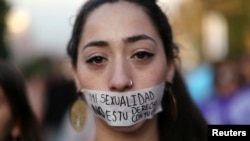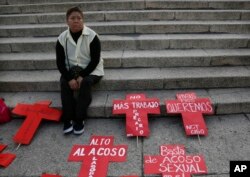Much remains to be done to turn the awareness of violence against women and girls into meaningful change, U.N. Secretary-General Ban Ki-moon said Friday.
“Violence against women and girls imposes large-scale costs on families, communities and economies,” Ban said in a statement Friday marking International Day for the Elimination of Violence Against Women and Girls. “When women cannot work as a result of violence, their employment may be put at risk, jeopardizing much-needed income, autonomy and their ability to leave abusive relationships.”
November 25 is the start of the United Nation’s 16-day campaign to raise awareness against gender-based violence. It ends December 10, Human Rights Day.
Resources, funding lacking
Violence against women and girls is not only a human rights violation but also an obstacle to sustainable development, Ban said. He lamented that efforts to address such violence, while having strong political commitment, suffer from lack of resources, including funding.
Watch: Reversing the Trend by artist and activist Rand Jarallah
“The statistics almost defy belief. What is even harder to understand is why: why men prey on women and girls; why societies shame the victims, why governments fail to punish deadly crimes, why the world denies itself the fruits of women’s full participation,” Ban said at a U.N. Women-hosted Orange the World event in New York.
“This is truly a matter of life and death,” he added. “In some countries, as many as 70 percent of women report having experienced physical or sexual violence from an intimate partner. In some countries, intimate partner violence accounts for between 40 and 70 percent of female murder victims.”
Ban said gender-based violence also results in lost productivity for businesses and drains resources from social services, the justice system and health care agencies. The net result, he said, is “enormous suffering as well as the exclusion of women from playing their full and rightful roles in society.”
Ban is observing the U.N. day for the last time as U.N. chief. Incoming U.N. Secretary-General Antonio Guterres takes over January 1, 2017.
Marches mark the day
Around the world, dozens of protests were held Friday to mark the day.
In Turkey, protesters, mostly women, in Istanbul and Ankara spoke out against a recent proposal in parliament that critics said would legitimize child marriages. The proposal was withdrawn in its current form earlier this week and submitted for review by a parliamentary committee after mass protests last weekend.
“They discussed a proposal [the child marriage bill] last week. We came together as 137 organizations to raise our voices against the laws against women that AKP [Turkey’s ruling Justice and Development Party] tried to inaugurate. We will tell them that we won’t let the parliament pass the bills that are against women and children,” Meltem Kolgazi, an academic, said.
Thousands protest in Buenos Aires
In Latin America, tens of thousands of demonstrators marched in Buenos Aires to protest horrific violence against women, a long-ignored issue in the region. About 200 women have been killed by former or current partners so far in 2016, AFP reported.
Thousands also marched in Chile, Uruguay, Colombia, Venezuela and Guatemala, with another planned Saturday in Peru, according to the French news agency AFP.
A study by the Pan American Health Organization (PAHO) found that domestic violence, which is illegal in Latin America, is vastly underreported. A PAHO study said only 14 percent of female victims report violent crimes they have suffered.
Activists call for women’s strike March 8.
Events focused on eliminating gender-based violence were also held this week in Israel, Australia, Afghanistan and the United Arab Emirates.
Buenos Aires protester Dora Machicado, 42, told AFP that equality for women would translate to less violence.
“Economic independence frees us from the violence of machismo,” she said.
Activists are also calling for a worldwide women’s strike March 8, 2017. Organizers said strikes are planned in Argentina, Germany, Italy, Russia, Israel, South Korea and Mexico.







